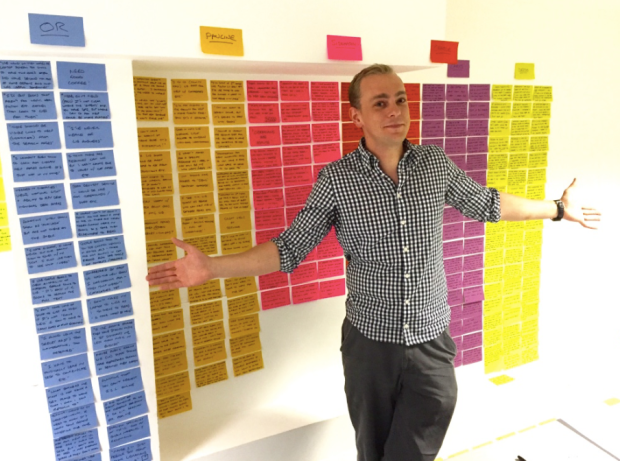We all know that…
It’s no secret that building strong relationships with research participants will encourage them to become more invested in studies and willing to commit, and that this can lead to a richer knowledge of an individual’s behaviours and needs, while also providing stronger insights into their wider framework of goals and values.
‘Cultural probes’ are used in the design world to find out more about particular user (or consumer) groups. Participants in these studies are given varied tasks to complete, with the intention of making them feel like they are involved in something new and exciting, as well as increasing their awareness of how much the researcher is invested in finding out more about them and their experiences and motivations.
SNAPSHOT
The importance and value of making research study participants feel invested was brought home to me by our recent Snapshot study, a cultural probe completed over two weeks by ten participants (postdoc researchers and PhD students at the University of Cambridge). The resulting data set was rich and varied, which led to some fascinating insights and opportunities for practical design interventions. I’m sure all of you have read our shiny and colourful report by now, so I won’t repeat too many of the details here! Instead, here I want to focus on the approaches we took to understand and connect with the participants.
KEEPING IN TOUCH
In order to foster strong relationships with our participants we decided that contact should be maintained throughout, both in person and digitally. I met with all ten participants at the start of the study, at locations of their choosing. There were two reasons for this: firstly, distributing the study packs (explaining the contents and reaching a mutual understanding of time commitments) and secondly, giving people my contact details and impressing on them that they could get in touch at any point and starting to try to understand about each person, their values, their reasons for being in their current position, their experiences of the University, and so on. Needless to say, the latter provided the bigger challenge. We had an extremely varied sample for the project, with participants ranging from 2nd year history PhD students, to postdoctoral researchers in the sciences and social sciences who were involved in cutting-edge international research projects. This was fantastic in terms of what we could potentially learn, however trying to get into the individual worlds of each of these people was going to be tricky. Tricky, but exciting.
MAKING CONNECTIONS
Over the two weeks that participants were busy completing their research diaries, along with tasks such as a photo study and unsupervised cognitive mapping exercise, many got in touch to say how much they were enjoying the study, and sometimes just to chat! The ethics aware side of me struggled with this more than slightly; during the study and particularly in the closing interviews I had invitations to jazz concerts and photography exhibitions that participants were involved in (not to mention the inevitable social media friend requests), as I attempted to learn more about what made our Snapshotters (no? Too cringey?) tick. When talking badminton with one of our PhD students during interview I was very proud of stopping myself offering to be a potential opponent!
ENRICHING THE DATA
I’m truly of the opinion that the impact these conversations and relationships had on the outcome of the study cannot be underestimated. When talking to a Zoology PhD student about their complex data set tracking animal foraging behaviour, I was able to ask about specific instances, “Oh, was that when you were in the field in […] last summer?”, because we’d talked about it when we met before the study commenced. I felt like I at least came to some understanding about the lives of postdoc Chemists working with computer code replicating chemical interactions (yes, all day!), and was able to ask more relevant questions about their information needs and behaviours based on this.
A LEARNING EXPERIENCE
It is very possible that I learnt more about myself as a researcher than about any of the participants who took part in our study. And I learnt a lot about each. The Snapshot research reinforced in me how important it is when attempting any kind of ethnographic research to understand as far as possible the motivations of your research participants, as well as the wider goals and values informing these. While I feel as though I now have a better understanding of this aspect of research, the work has also highlighted to me that it is important to remain removed to an extent, focusing on the research itself as well as the subject. A lot of this understanding came out of the interviews I conducted with our participants at the end of the study. I had of course read and listened to people talk about the importance of silence on the part of the interviewer. It was only during the Snapshot study however that I really put this into practice, and I was amazed by the results. Giving people the time to reflect on and continuing thinking about what they have just said during interview leads to them opening up more and talking about things that they may not have even realised were important to them.
THE VALUE OF ETHNOGRAPHY
Ethnography asks us to constantly and consistently re-evaluate the way in which we think about and view the world. We should also to apply this process and these values to thinking about ourselves and the way in which we conduct research. We would never presume to know everything about a particular user group or community, so should continue to analyse and evaluate our own behaviour for the same reasons. I personally look forward to finding out more about myself, as well as the fascinating people I have the opportunity to work with.
David Marshall
@david_mlib
dm622@cam.ac.uk
